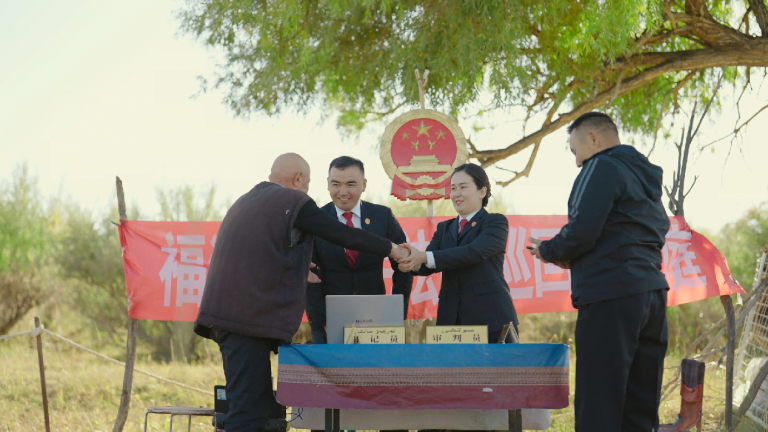
By Li Ya’nan, In Fuhai County, Altay prefecture, northwest China’s Xinjiang Uygur autonomous region, local herders live in scattered settlements and often move from pasture to pasture to graze their livestock following the changes of seasons.
To provide convenient and efficient judicial services to the herders, the People’s Court of Fuhai has established “mobile courts” – judges visiting yurts, going to pastures, driving cars, and riding horses to help the herders.
In September last year, as the chill of winter began to set in, the herders at a summer pasture were preparing to move. Judge Aray Bahetbiek and clerk Dosjan Dawkien from the People’s Court of Fuhai visited the pasture to mediate a dispute.
“There was a dispute over a livestock leasing contract, and all parties involved were at the pasture. To save them from traveling, we decided to handle the case in the pasture,” said Aray Bahetbiek.
According to her, the plaintiff had entrusted over 200 sheep to the defendant for grazing, but the defendant unilaterally disposed of 130 of them. After coordination by the village committee, the defendant wrote a promissory note but has yet to provide compensation.
Early in the morning, Aray Bahetbiek and Dosjan Dawkien set off, driving a car. After nearly four hours, they reached a point where there was no road ahead. They parked the car, borrowed horses from herders nearby, and continued their journey.
Both parties involved in the case were present in the pasture as they had been notified in advance. It was learned that the two parties are relatives, which was why the lawsuit was delayed. The defendant’s child fell seriously ill, and to afford medical treatment, he sold the plaintiff’s sheep. Due to financial difficulties in recent years, he was unable to repay the debt on time.
“You both know how the thing is, and there is no dispute regarding the compensation. The only disagreement is about the repayment period. If the court makes a ruling, you will have a maximum of two to three months to repay the debt. If you are unable to do so, the enforcement procedure will be initiated, and you may have to sell all your sheep and cows. Moreover, others will lose trust in you, and not let you help them with livestock herding. How will you manage your life in the future? Can you repay a portion of the debt now and then make installment payments to settle the remaining?” Aray Bahetbiek asked the defendant.
“Okay, I promise to repay it over five years,” the defendant agreed.
“You know his situation. He definitely can’t repay the money all at once. Since you are a relative, it would be great if you help him out. According to what he said, he will repay you in full over five years. What do you think?” Aray Bahetbiek tried to persuade the plaintiff.
“I understand his difficulties, which is why I’ve been patient until now. But what if he can’t repay as agreed after five years?” The plaintiff still had doubts.
“If you agree, I can draft a mediation agreement right now. If he fails to repay you as promised, you can apply for enforcement using the agreement,” Aray Bahetbiek told the plaintiff.
Seeing the two pressing their fingerprints on the mediation agreement and shaking hands, Aray Bahetbiek breathed a sigh of relief. “We try our best to resolve the issue at hand, which can save the parties involved a lot of costs,” she told People’s Daily.
In a place where there were many yurts, People’s Daily reporters encountered judge Zhang Peiyu, who was surrounded by a dozen herders.
“My three cows were eaten by a bear, who should compensate me?”
“What should I do if I bought fake goods online?”
“The land transfer fee has increased, can I renegotiate the contract?”
Zhang patiently answered each of the herders’ questions, and the herders bid farewell to him holding a legal knowledge brochure.
“Since the herders live in scattered areas, we carry materials and brochures in our cars and stop wherever there are many people to hold ‘rule of law classes’ like this, to raise their legal awareness,” Zhang explained.
“We have developed a model combining mobile court hearings, legal education, and legal services. By providing door-to-door legal services, we have successfully mediated 50 percent of the disputes, and for complex cases, we proceed with court hearings, “said an official with the People’s Court of Fuhai.
In addition to mobile courts, the People’s Court of Fuhai also offers online court hearings for cases where the parties are not present locally, which helps reduce litigation costs for the parties, the official added.
Resolving conflicts on the spot is not an easy task for judges. The pastoral areas are vast, and it takes a long time on the way. It is common for the judges to encounter muddy roads and spend the night on the grassland.
“When the car can’t go any further, we ride motorcycles or horses. And if even horses can’t reach certain places, we walk. It’s hard work. But the law is not just cold and rigid rules. Through our efforts, we make the parties involved feel the warmth of the rule of law, and that makes our efforts worthwhile,” said Aray Bahetbiek, adding that many herders now know her and affectionately call her “daughter.”
“This is also a recognition of my efforts,” she said.










